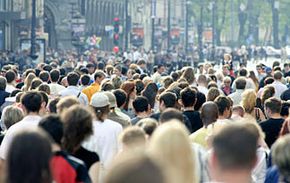The world is growing at an amazing rate. Currently, the Earth’s population is growing by 60,000 people every eight hours -- that’s two children born every second somewhere around the globe. Experts believe if we continue to grow at this pace, we’ll need 50 percent more energy to sustain humanity by 2050. And that’s not all; more people means we'll need more food, water and shelter, putting a strain on our renewable resources, as well.
Keep reading to learn how population growth will affect energy.
Advertisement

